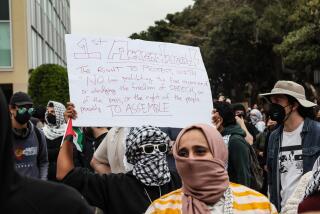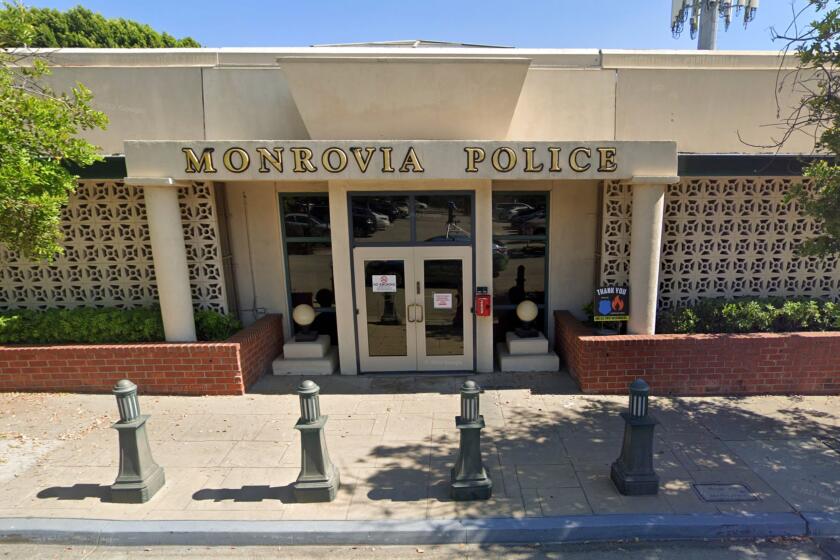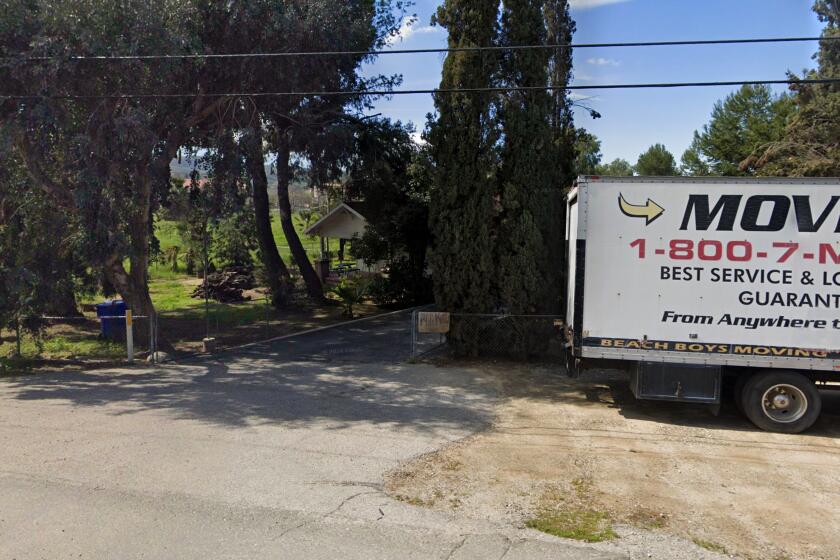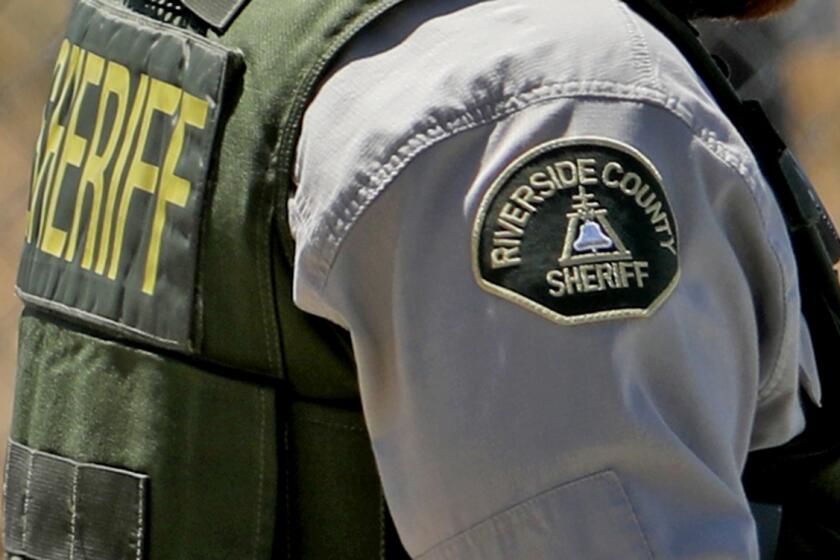Measure R: Referendum on O.C.’s Future
Seven months after Orange County’s high-wire investment act hit the floor in a $1.7-billion free fall, voters will decide Tuesday on Measure R, the centerpiece of the county-crafted resolution to the worst municipal bankruptcy in U.S. history.
The half-cent sales tax increase, known as the Countywide Bankruptcy Recovery Sales and Use Tax, is the key to the multi-pronged solution crafted by county officials and advisers recruited from the West Coast’s financial and legal community. It goes on the ballot in an unusual, one-issue election.
If approved by a majority of the voters, Measure R would increase the sales tax in Orange County from 7.75% to 8.25%, raising about $130 million annually for the next 10 years. The tax would cost the county’s 2.6 million residents about $50 a year each, though proponents say 20% of that would be borne by tourists and other visitors.
The plan is touted as the one sure way out of the county’s continuing insolvency and cavernous debt. Opponents say better solutions will be embraced once Measure R is defeated. Either way, observers throughout the county agree Tuesday will be a singular moment in the county’s return to solvency.
The election “is a significant foundation for the county’s future, no matter which way the vote ends up,” said political consultant Harvey Englander. “It is a defining moment as to the methodology to get there. If it passes, recovery will happen faster, but Measure R’s failure will be proof the voters no longer trust their leadership and elected officials in the county and the state will have to become a lot more accountable and proactive.”
Opponents say the tax is headed for certain defeat.
“This will lose by 20 points,” said Buck Johns, an organizer of Citizens Against the Tax Increase, the business and Republican Party group battling Measure R. “People who are going to vote have made up their minds; that is reflected in the huge numbers of absentee ballots and the pre-election polling.”
The measure’s proponents, who have spent lavishly and flooded the county with 2.5 million pieces of mail, offer no definitive prediction.
“I think this is going to be a close election,” said Sheriff Brad Gates, who heads Citizens for Fiscal Responsibility, the main Yes on R committee. “. . . . The higher the turnout, obviously then chances of us being successful go up.”
For a special election, voter interest is very high, fueled by the incredible saga of the bankruptcy, the vigorous campaigns, an unprecedented number of community forums and debates and extensive media coverage. Both sides were pressing hard in the final week of the campaign, using phone banks, rallies and mailers.
Absentee ballot applications totaled a stunning 175,729; by Friday, 125,090 had voted by mail. The number of applicants surpassed even the 1992 presidential race. Absentee voters typically comprise between 20% and 50% of the vote.
Turnout is the key to the election. Proponents believe they will lose if fewer than 40% of the county’s 1.1 million registered voters take part. That’s because consistent voters here--those who vote in election after election--tend to be older and more conservative, and they are generally anti-tax.
“We certainly can’t win in the 30% [turnout] range,” said Stu Mollrich, whose firm, Butcher, Forde & Mollrich, is coordinating the campaign for Gates’ group. “And the closer to 50%, the better I like it.”
That view was generally borne out in the battle over Measure M, the half-penny sales tax increase for transportation projects. In November, 1989, the measure was alone on the ballot and turnout was a woeful 22.6%. The measure lost 52.6% to 47.4%.
A year later, it was back, but in a general election that included the governor’s race, and turnout ballooned to 62.1%. Measure M redux won 54.8% to 45.2%.
Polls show Measure R backers facing a tough challenge. A Times Orange County Poll taken in early June showed the tax trailing among likely voters by 50% to 37%, with 13% undecided. The poll found voters angry and mistrustful. More than half believed county leaders waste “a lot” of tax money and “pay very little or no attention” to what their constituents think.
Proponents acknowledge that residents’ scorn for a government that “gambled away” $1.7 billion of taxpayers money comes up again and again when voters talk about the tax.
Part of that anger is focused on the Board of Supervisors, who voted unanimously March 28 to place the measure on the ballot. Three of the current board members were in office when longtime Treasurer-Tax Collector Robert L. Citron, who has resigned and pleaded guilty to six felony charges, mishandled the county investment pool.
Two weeks ago, Supervisor Gaddi H. Vasquez, who supports the tax, announced he would not seek reelection. Though he denied the bankruptcy played a role, many consider him a victim of the fiscal meltdown. Supervisors Roger R. Stanton and William G. Steiner, who were also in office when the county declared bankruptcy, have spurned Chief Executive Officer William J. Popejoy’s requests that they not run again for the good of the county.
Supervisors Jim Silva and Stanton have come out against the tax increase. Steiner and Supervisor Marian Bergeson are for the tax, which is part of a recovery plan that also includes a sale of county assets; $188 million in cuts that have been made to the county’s $463 million general fund; the opening of county landfills to out-of-county trash; the layoff of about 700 workers and elimination of 2,000 vacant positions from a work force of 18,000.
The county has also discussed repudiating some of the $600 million it owes bondholders.
The county owes about $2 billion, half of it to bondholders and vendors, and the rest to the schools, cities, special districts and county agencies that were participants in the failed investment pool. The county has come up with about $1 billion, says Bruce Bennett, the county’s bankruptcy attorney.
That’s where Measure R comes in.
Its $130 million in annual revenue would go into the general fund, freeing a similar amount so the county can borrow against it.
Measure R provides for an oversight committee, whose duties would include calling for an end to the tax before 2005, if the revenue is no longer needed for recovery purposes. Repeal would require a majority vote of the supervisors and county voters.
Opponents argue that turning to a tax is premature, saying the county has failed to do all it can to trim government, find new revenue, privatize agencies and sell off assets.
Numerous tax opponents have offered alternatives, ranging from Supervisor Stanton--who wants to sell John Wayne Airport and stretch out debt repayment--to the People’s Response, which calls for increasing taxes on corporations and wealthy residents.
Some in the loose-knit coalition opposed to the sales tax favor returning to cities and special districts only part of the money they had in the failed investment pool. Many are calling for another referendum, this one to tap the Measure M transportation sales tax fund. Others, who label the bondholders “gamblers,” advocate refusing to repay them in full.
Bruce Whitaker, chief spokesman for the Committees of Correspondence, which opposes the tax, says county leaders have not seriously explored alternatives. “We always felt that taxes should be the last resort, not the first,” he said. “We think you lose all the leverage for a solution, if taxpayers throw money at a problem up front.”
The No side sees the Measure R as a tool of entrenched interests--developers and bureaucrats--and calls proponents such as Gates and Irvine Co. Chairman Donald L. Bren Bren “counterfeit Republicans.”
Its coalition includes some business leaders, seniors, city officials, anti-government activists, Libertarians, remnants of Ross Perot’s United We Stand America organization and some Democrats. The county Republican Party and the Lincoln Club also vigorously oppose the tax, as does every member of the county’s legislative delegation.
Proponents argue that the tax is the only credible and speedy way to repay the county’s debt. This quick cauterizing of the county’s wounds, they say, would be less expensive in the long run--in part by protecting the county’s bond rating--and will safeguard the Orange County “way of life.”
Popejoy and Gates have said the sale of the airport and the tapping of Measure M transportation funds to aid recovery would be illegal or impossible to achieve within a workable period.
Under Measure R, proponents say, Orange County can emerge from bankruptcy in about a year, by choosing a planned, businesslike approach that controls the costs and the time frame.
“We live in a community where we have collective shared responsibility,” said Connie Haddad, president of the League of Women Voters, a co-chairperson of Citizens for Fiscal Responsibility. “Voting ‘Yes’ is the honorable thing to do and it is the practical and sensible thing to do.”
Tax supporters, who unleashed some 700,000 pieces of mail in the last week of the campaign, have formed an unusual alliance. They have pulled together much of big business and labor, as well as parent and school groups, and some prominent Republicans--such as Bren and Lincoln Club Vice President Tom Malcolm.
The group has endorsements from Common Cause and the League of Women Voters, among others. The county Democratic Party has come out for the tax, but its chairman, Jim Toledano, is against it.
The two Yes on Measure R campaigns have raised about $1.5 million, while the two No on R campaigns have raised about $80,000, according to campaign reports. Both are considerably short of their goals; proponents had sought to raise about $3 million, while the No on R group expected to raise $300,000 to $500,000.
For most, the election is a defining moment for the county.
The tax is a “watershed issue,” said county GOP Chairman Thomas A. Fuentes. “No officeholder who supports the passage of Measure R could ever hope to be reelected,” he said, likening the tax vote to litmus-test issues such as Proposition 13, the death penalty and the recall of state Supreme Court Chief Justice Rose Bird.
Irvine Co. Executive Vice President Gary Hunt said Tuesday’s outcome will mark the county. If Measure R is approved, he said, voters “will be saying they are accepting the moral responsibility to do what is right. And what is right is to pay our debts.”
Otherwise, Hunt said, “there isn’t enough money to give everyone what they want. So, everyone will end up a loser.”
Despite the county’s layoffs and budget cuts, both sides still talk of the need to restructure county government. Some even want to eliminate it entirely, ceding power to the cites; others see an elected county mayor and part-time supervisors.
Whitaker sees a changed world after Tuesday: “I believe defeat of this puts a lot of things in play.”
Whatever the election’s outcome, Gates said, both sides must come together immediately to solve the problem, by turning to the internal taxing authority of the county and its local governments.
“We ought to try to quarantine this problem to Orange County,” he said. “We should not be willing to affect our neighbors’ bond ratings and costs they would be required to pay. We shouldn’t affect the people of this state and the state government because of our problem.”
Some in the financial world say it is too late for that.
“This is a disaster for California credit,” said Joe Mysak, editor of Grant’s Municipal Bond Observer. The market--aware that California municipalities cannot readily tax residents to back up their pledge to repay general obligation bonds--has demanded in recent weeks that localities in the state insure their annual short-term borrowings.
Mysak called the idea that the county still might repudiate all or part of its debt, “madness, insanity,” saying borrowing would become far more costly for the county.
“If you asked two or three years ago, ‘Who is going to default on debt or express an unwillingness to pay it back?’ Orange County would have come in dead last,” he said.
(BEGIN TEXT OF INFOBOX / INFOGRAPHIC)
Differing Opinions
Proponents and critics of Measure R differ sharply on the effects of a proposed half-cent sales tax increase. Here are some of the arguments for and against the tax hike:
SUPPORTERS SAY
* Would allow the county to make debt payments and avoid defaulting on loans
* Would help prevent additional cuts in public services and school district budgets
* Offers quickest, least expensive path out of bankruptcy
OPPONENTS SAY
* Would hurt the economy; county can recover from bankruptcy without tax, by cutting elsewhere or tapping other funding sources
* Money generated from Measure R would not be specifically earmarked for schools or law enforcement
* Would punish taxpayers for county officials’ mistakes
Source: Times reports
More to Read
Start your day right
Sign up for Essential California for news, features and recommendations from the L.A. Times and beyond in your inbox six days a week.
You may occasionally receive promotional content from the Los Angeles Times.






